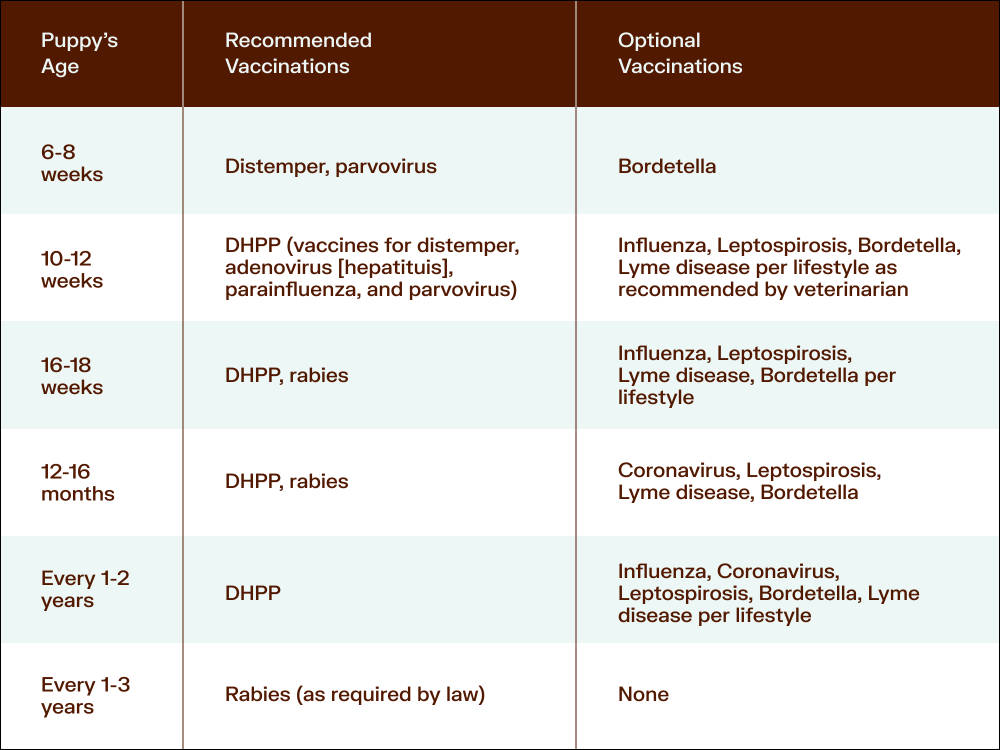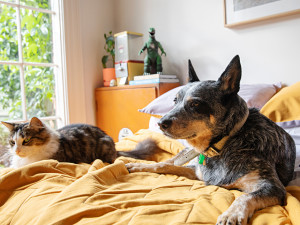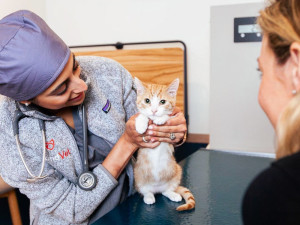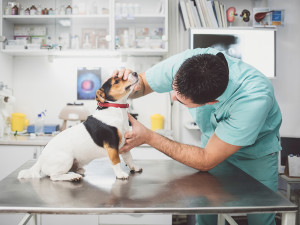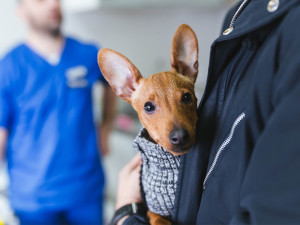When, Exactly, Should You Vaccinate Your Puppy?
If it’s time for a round of shots (no, not that kind), follow this guide.

share article
As a kid — OK, as an adult, pre-pandemic — it’s unlikely you ever looked forward to a jab (when did we start calling them jabs?). And as pet parents, there’s a whole new kind of needle anxiety: When it comes to vaccinating our pups, where are we supposed to start? The process of scheduling more than a handful of puppy shots can be dizzying. Fear not; we’ll explain everything.
Types Of Dog Vaccines
The first thing to know is that your dog’s shots are split into two groups: core and non-core vaccines. Your vet can personalize a vaccination protocol to your dog based on their age, lifestyle, and risk of contracting various diseases in the places where they spend time.
Core Vaccines
If you’re wondering which dog vaccines are absolutely necessary, core vaccines are the group you’re looking for. Core vaccines are named as such because they prevent the most common and dangerous diseases, and if all dogs get them (as they should), it can lead to herd immunity; an example of a core vaccine for dogs is the rabies vaccine. Core vaccines are recommended for all dogs.
Non-Core Vaccines
Non-core vaccines are not recommended for all dogs. They protect against diseases that are less common or that are only a risk for dogs that are exposed to certain environments or activities.
Core Vaccines for Dogs
Rabies
The one vaccine you’ll likely recognize, rabies is required by law in most states because the disease is deadly to pets and their people. While cases in either are rare (thanks to herd immunity, no doubt) rabies can still be carried by wildlife, such as raccoons and coyotes — so it’s low risk, not no risk.
DA2PP / DHPP
These core-combination vaccines are vital to kick-starting your puppy’s immune system to make antibodies for all of these pathogens: distemperopens in a new tab, adenovirus 2, hepatitis, parvovirusopens in a new tab, and parainfluenza. Despite being a potent cocktail, this one requires a couple of boosters, spaced out a month apart.
Non-Core Vaccines for Dogs
Leptospirosis
This infectionopens in a new tab is caused by bacteria that can be transmitted through the urine of an infected animal (usually rats), either by direct contact or contact with contaminated soil or water. It wreaks havoc on dogs’ kidneysopens in a new tab and liver, and can be fatal in severe cases. Though there are antibiotics that treat it, your vet may recommend the vaccine if you live in high-risk areas like cities (because: rats) and/or if your dog drinks from puddles of standing water on walks. Some vets offer a DHLPP combo vaccine, which is DHPP plus lepto.
Bordetella
The Bordetella pathogen is the most common cause of kennel coughopens in a new tab, which is super contagious. It’s also pretty easily treated with antibiotics, but if your dog hangs out at dog parksopens in a new tab or doggie daycareopens in a new tab on the regular, it’s wise to get them covered with this vaccine. In fact, most kennels require it if your pup will be boarding there day or night. This one runs its course in six months, so stay up-to-date with the boosters.
Canine Influenza
Flu shots aren’t just for dog parents. Similar to Bordetella above, canine fluopens in a new tab is recommended for pups with healthy social lives (dog park, daycare, etc.).
Lyme Disease
As if ticksopens in a new tab weren’t ghoulish enough, they carry Lyme disease, which is debilitating to humans and dogs alike. While less of a threat in an urban area, Lyme disease is pretty rampant in rural, wooded environments. If you live in such an area, your vet will highly recommend it. And if you’re an urbanite who spends weekends in the great outdoors (lucky dog!) you should also consider this vaccine.
Puppy Vaccine Schedule
At this point, you may be thinking, Thanks, you’ve made the process clear as mud. Knowing what vaccines are out there is only the beginning; you also need to know when to vaccinate puppies. If you’re a new puppy parent, clear your calendar. It’s recommended that puppies begin their puppy schedule of shots at eight weeks old, then are boosted every three to four weeks. (Of course, you can’t always know a rescue pup’s birthdate, but your vet can estimate their age.) Here’s what a schedule typically looks like:
Eight weeks
At eight weeks, your puppy will receive the first dose of DA2PP and Bordetella (if it’s recommended).
12 weeks
At 12 weeks, it’s time for a second dose of DA2PP and a Bordetella booster (again, if it’s recommended).
16 weeks
At 16 weeks, they’ll be given their last DA2PP booster, along with their first rabies shot.
How much do puppy shots cost?
How much pup vaccination costs depends on your veterinarian’s specific rates, but it’s safe to assume you will spend about $20 to $75 for each shot. Some veterinarians offer vaccination packages, which lower the cost-per-shot. If you need assistance paying for your pup’s healthcare, several organizationsopens in a new tab exist that can help. It’s worth asking your local animal shelter if they offer free or low-cost vaccination services, too.
Adult Dog Vaccine and Booster Schedule
After the sixteen week mark, your puppy should be all set until they’re one year old; afterwards they’ll need the following boosters: Bordetella every six months, DA2PP annually, Lepto and/or Lyme (if recommended) also annually, and rabies every three years. It’s important to keep in mind that this is a standard vaccination schedule, but your vet may tailor it to your dog’s unique situation and adjust it as they age (i.e. senior dogs or dogs with health issues should skip certain vaccines).
Vaccine Schedules For Adult Rescue Dogs
If you’ve adopted an adult dog, first of all, that’s amazing. Many adult rescue dogs don’t come with a convenient vaccination history, though. In this case, it’s pretty safe to stick with rabies, DA2PP, and whichever non-core options your vet recommends (excluding ill or exceptionally elderly dogs). Alternately, you can opt for a Titeropens in a new tab, a blood test that measures antibodies and determines if your dog is already immune.
What are the adverse reactions caused by vaccines in dogs?
It’s common for pets to have some side effects after vaccination. These side effects shouldn’t last for more than two days or cause extreme discomfort; if either of those things are true, your pup should go back to the vet ASAP.
Pain or Swelling at the Injection Site
Pain and swelling at the injection site is very common. Avoid applying pressure to the area where your pup got their shot, and let them rest up as much as they can. Firm swelling under the injection site may last longer than a few days; you should contact your veterinarian if it lasts longer than three weeks or is growing larger.
Mild Fever
Your pup also may have a mild fever. Dogs run warmer than humans; a fever for a dog is any temperature above 103 degrees Fahrenheit.
Lethargy
Lethargy, including a decreased appetite, is another common symptom. Your pup may get a few more naps in that usualopens in a new tab, have a decreased appetiteopens in a new tab, or seem depressed.
What should I do if my dog misses a vaccine?
If your dog misses a vaccine booster, you should contact your veterinarian right away. They can help you determine the best way to get on track. If your pup is only a few weeks late, they may be able to get the booster without a problem. If months or years have passed, your pup will likely have to restart the vaccination course to be sure they are fully protected. For viral diseases, your veterinarian may be able to measure your dog’s antibody levels through a blood test and determine how protected they are.
Figuring out a schedule for puppy shots can seem intimidating, but it’s nothing to worry about. Your puppy or adult rescue dog will get their core vaccines and relevant non-core vaccines, and then they’ll be safe to hang out safely with all their new pup friends at the dog park.
That said, before you leash up your pup, you should avoid taking your dog to dog parks or other areas where they may be exposed to other dogs for a few days after vaccination. Keep your dog away from other animals, such as cats and rodents, too. And though allergic reactions to vaccines are rare, they’re important to keep an eye out for: If your pup experiences itchy skin and hives; persistent vomitingopens in a new tab or diarrheaopens in a new tab; swelling around the face, neck, and eyes; or difficulty breathing, take them to the vet right away.
FAQs (People Also Ask)
1) How often should my dog receive vaccinations?
It’s recommended that puppies begin their puppy schedule of shots at eight weeks old, then are boosted every three to four weeks. After the puppy schedule, your dog should be vaccinated annually or according to your vet’s instructions.
2) How much does it cost to vaccinate a dog?
How much pup vaccination costs depends on your veterinarian’s specific rates, but it’s safe to assume you will spend about $20 to $75 for each shot.
3) What should I do if my dog misses a vaccine?
Contact your veterinarian right away; they can help you determine the best way to get on track. Depending on how much time has passed between vaccinations, your pup may have to restart their vaccination schedule or continue with boosters as planned.
4) What are the adverse reactions caused by vaccines in dogs?
Dogs can experience pain or swelling at the injection site, mild fever, or lethargy.
5) How many rounds of shots do puppies need?
Puppies need three rounds of vaccines in their first year. They can then be boosted on an annual schedule.
References
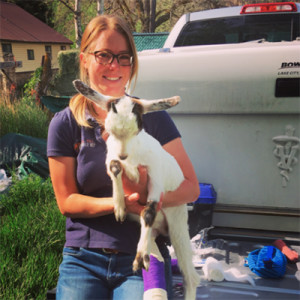
Oneal Bogan, DVM
Oneal Bogan, DVM, is a mixed animal veterinarian from Colorado. Dr. Bogan loves the variety of animals she gets to work with. She owns her own mobile practice which provides at-home care to large and small animals. Dr. Bogan also works at a local small animal clinic. In her free time, Dr. Bogan loves to hike, ride horses, and read. She also loves writing and hopes her advice helps all pets live a happy, healthy life.
Related articles
![French bulldog puppy looking scared at vet]() opens in a new tab
opens in a new tab10 Things to Ask at Your First Vet Visit
There are no stupid questions — well, when it comes to your dog’s health.
![shiba inu snuggling on couch with woman]() opens in a new tab
opens in a new tabMoney Talks: The Dollars of Dog Parenthood
We crunched some numbers and yup, they’re worth every penny.
![A smiling veterinarian holding a cat]() opens in a new tab
opens in a new tabVets Are at High Risk For Compassion Fatigue—Here Are 4 Ways You Can Help
It’s extra important to be nice to the vet in your life.
![A vet examining the neck of a small dog on the examination table]() opens in a new tab
opens in a new tabLymphoma Cancer in Dogs: What You Need to Know
Find out what causes lymphoma in dogs and how you can help your pup.
![Person holding a mix breed dog talking to veterinarian about their concerns.]() opens in a new tab
opens in a new tab8 Things Your Veterinarian Wishes You Wouldn’t Do
Common vet pet peeves, if you will.
![A dog coughing]() opens in a new tab
opens in a new tabA Dog in Massachusetts Died After Showing Signs of Kennel Cough—Here’s How You Can Protect Your Pup
Everything you need to know about this super contagious disease. (Hint: There’s a vaccine.)


